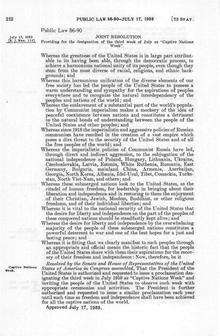Captive Nations Week

Captive Nations Week, a week aimed at raising public awareness of the oppression of nations under the control of Communist and other non-democratic governments, began in 1953 and was declared by a Congressional resolution and signed into law (Public Law 86-90) by President Dwight D. Eisenhower in 1959. President Eisenhower, and every successive U.S. President up to the administration of President Barack Obama, has declared the third week of July to be Captive Nations Week.
The American foreign policy expert George Kennan, serving at the time as ambassador to Yugoslavia, sought unsuccessfully to dissuade President John F. Kennedy from proclaiming the week on the ground that the United States had no reason to make the resolution, which in effect called for the overthrow of all the governments of Eastern Europe, a part of public policy.
Criticism
The Captive Nations Week proclamation has been the subject of Soviet criticism.[1]
See also
References
- ↑ Dobriansky, Lew E. (December 30, 1979). "Another Captive Nations Week". LXXXVI (296). The Ukrainian Weekly: 3. Retrieved 2011-04-23.
Bibliography
- Address of the Russian intellectuals to the Congress of the United States of America - Social Design Corporation. July 14, 2008.
- Fighting the 'Captive Nations Week Resolution' (Archived) - Congress of Russian Americans, Inc. 1999.
- Captive Nations Week, 2008 White House. 2008.
- Tim Weiner and Barbara Crossette. "George F. Kennan Dies at 101; Leading Strategist of Cold War". New York Times. March 18, 2005.
- George F. Kennan: Cold War Iconoclast. Walter Hixson, 1988.
| ||||||